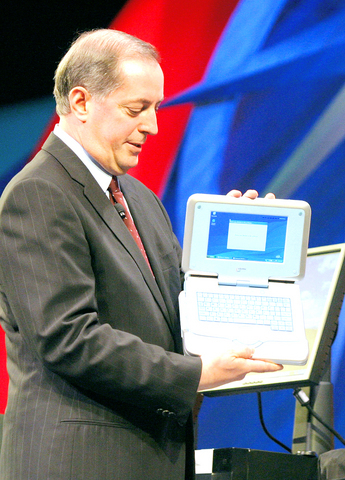The head of the world's largest chipmaker on Wednesday unveiled a new mobile personal computer designed to provide affordable, collaborative learning environments for teachers and young students.
Codenamed "Eduwise," Intel Corp CEO Paul Otellini said the US$400 machines will feature built-in wireless and will be able to run Microsoft Corp's Windows or Linux operating systems.
"What we want to do is accelerate to uncompromised technology for everyone in the world," Otellini said during a demonstration at the World Congress on Information Technology in Austin. "No one wants to cross the digital divide with yesterday's technology."

PHOTO: AP
The flip open Eduwise computer includes a handle, light blue accents and snaps shut like a purse. Special software allows students in a classroom to view presentations, take tests and interact individually with their teachers using a built-in wireless connection.
The cheaper PCs are part of a US$1 billion investment by Intel over the next five years to promote the use of computers in schools, cafes and other public spots in developing countries, Otellini said.
The Eduwise machine was designed by Intel, but will be built by its computer-making customers. Otellini said the devices should be available next year.
Many high-tech companies, including Intel rival Advanced Micro Devices Inc (AMD) and Microsoft, have announced similar initiatives to close the digital divide between developed and developing nations.
Massachusetts Institute of Technology professor Nicholas Negroponte's nonprofit One Laptop Per Child association hopes to begin providing US$100 laptops to millions of children in China, India, Egypt, Brazil, Thailand, Nigeria and Argentina by early next year.
Tentative designs call for a machine using one-tenth of the power of conventional laptops, a 17.7cm screen and a Linux operating system. The project's partners include Google Inc and AMD.
In an earlier speech at the conference, Microsoft CEO Steve Ballmer said the benefits of this global spread of technology are only starting to be felt.
"What we see going forward over the next five, 10, 15 years is a world of technology that has the potential itself to be even more important than the positive change it has enabled society in the past 10 years," he said.
"Computers will see, computers will listen, computers will understand. Computers will help the world grow smaller and help people to collaborate in new ways," he said.
Otellini also doubled former Intel CEO Andy Grove's prediction in 1996 that there would someday be more than a billion computers connected to the Internet.
He said the billion mark should be reached by next year, and that figure could double in five years because of cheaper, more powerful computers and the spread of the Internet to rural regions with the deployment of a long-range wireless technology called Wi-Max.
Otellini also said that Intel had reached a deal with the Mexican government to provide new low-cost PCs to 300,000 teachers by the end of this year.

The CIA has a message for Chinese government officials worried about their place in Chinese President Xi Jinping’s (習近平) government: Come work with us. The agency released two Mandarin-language videos on social media on Thursday inviting disgruntled officials to contact the CIA. The recruitment videos posted on YouTube and X racked up more than 5 million views combined in their first day. The outreach comes as CIA Director John Ratcliffe has vowed to boost the agency’s use of intelligence from human sources and its focus on China, which has recently targeted US officials with its own espionage operations. The videos are “aimed at

STEADFAST FRIEND: The bills encourage increased Taiwan-US engagement and address China’s distortion of UN Resolution 2758 to isolate Taiwan internationally The Presidential Office yesterday thanked the US House of Representatives for unanimously passing two Taiwan-related bills highlighting its solid support for Taiwan’s democracy and global participation, and for deepening bilateral relations. One of the bills, the Taiwan Assurance Implementation Act, requires the US Department of State to periodically review its guidelines for engagement with Taiwan, and report to the US Congress on the guidelines and plans to lift self-imposed limitations on US-Taiwan engagement. The other bill is the Taiwan International Solidarity Act, which clarifies that UN Resolution 2758 does not address the issue of the representation of Taiwan or its people in

US Indo-Pacific Commander Admiral Samuel Paparo on Friday expressed concern over the rate at which China is diversifying its military exercises, the Financial Times (FT) reported on Saturday. “The rates of change on the depth and breadth of their exercises is the one non-linear effect that I’ve seen in the last year that wakes me up at night or keeps me up at night,” Paparo was quoted by FT as saying while attending the annual Sedona Forum at the McCain Institute in Arizona. Paparo also expressed concern over the speed with which China was expanding its military. While the US

SHIFT: Taiwan’s better-than-expected first-quarter GDP and signs of weakness in the US have driven global capital back to emerging markets, the central bank head said The central bank yesterday blamed market speculation for the steep rise in the local currency, and urged exporters and financial institutions to stay calm and stop panic sell-offs to avoid hurting their own profitability. The nation’s top monetary policymaker said that it would step in, if necessary, to maintain order and stability in the foreign exchange market. The remarks came as the NT dollar yesterday closed up NT$0.919 to NT$30.145 against the US dollar in Taipei trading, after rising as high as NT$29.59 in intraday trading. The local currency has surged 5.85 percent against the greenback over the past two sessions, central